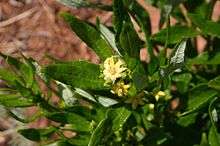Fadogia
| Fadogia | |
|---|---|
 | |
| Fadogia homblei | |
| Scientific classification | |
| Kingdom: | Plantae |
| Clade: | Angiosperms |
| Clade: | Eudicots |
| Clade: | Asterids |
| Order: | Gentianales |
| Family: | Rubiaceae |
| Subfamily: | Ixoroideae |
| Tribe: | Vanguerieae |
| Genus: | Fadogia Schweinf. |
| Type species | |
| Fadogia cienkowskii Schweinf. | |
Fadogia is a genus of flowering plants in the family Rubiaceae. The genera Rytigynia and Fadogia form a strongly supported clade but neither of these genera is monophyletic.[1]
Distribution
Fadogia is found in Tropical Africa. F. cienkowskii and F. tetraquetra have the largest distribution and occur from Guinea to the Transvaal province. F. ancylantha and F. erythrophloea are also found in many African countries, but they don't occur so far south. The countries with the highest number of species are Angola, Democratic Republic of the Congo, Zambia, Tanzania, and Central African Republic.[2]
Bacterial leaf symbiosis
Endophytic bacteria are housed in the intercellular space of the leaf mesophyll tissue. The presence of these bacteria can only be microscopically ascertained. The bacteria are identified as Burkholderia, which is a genus that is also found in the leaves of other Rubiaceae species. Their function remains enigmatic.[3][4]
Gousiekte
Fadogia homblei is known to cause gousiekte, a cardiotoxicosis of ruminants characterised by heart failure four to eight weeks after ingestion of certain rubiaceous plants.[5]
Species
- Fadogia ancylantha Schweinf.
- Fadogia andersonii Robyns
- Fadogia arenicola K.Schum. & K.Krause
- Fadogia audruana M.Fay, J.-P.Lebrun & Stork
- Fadogia butayei De Wild.
- Fadogia caespitosa Robyns
- Fadogia chlorantha K.Schum.
- Fadogia chrysantha K.Schum.
- Fadogia cienkowskii Schweinf.
- Fadogia cinerascens Robyns
- Fadogia elskensii De Wild.
- Fadogia erythrophloea (K.Schum. & K.Krause) Hutch. & Dalziel
- Fadogia fragrans Robyns
- Fadogia fuchsioides Schweinf. ex Oliv.
- Fadogia glaberrima Welw. ex Hiern
- Fadogia gossweileri Robyns
- Fadogia graminea Wernham
- Fadogia homblei Robyns
- Fadogia lactiflora Welw. ex Hiern
- Fadogia latifolia A.Chev. ex Robyns
- Fadogia leucophloea Schweinf. ex Hiern
- Fadogia luangwae Verdc.
- Fadogia oblongolanceolata Robyns
- Fadogia obscura A.Chev. ex Robyns
- Fadogia olivacea Robyns
- Fadogia parvifolia Verdc.
- Fadogia pobeguinii Pobég.
- Fadogia punctulata Robyns
- Fadogia rostrata Robyns
- Fadogia salictaria S.Moore
- Fadogia schmitzii Verdc.
- Fadogia spectabilis Milne-Redh.
- Fadogia stenophylla Welw. ex Hiern
- Fadogia tetraquetra K.Schum. & K.Krause
- Fadogia tomentosa De Wild.
- Fadogia triphylla Baker
- Fadogia variifolia Robyns
- Fadogia verdcourtii Tennant
- Fadogia verdickii De Wild. & T.Durand
- Fadogia vollesenii Verdc.
External links
![]() Media related to Fadogia at Wikimedia Commons
Media related to Fadogia at Wikimedia Commons
References
- ↑ Lantz H, Bremer B (2005). "Phylogeny of the complex Vanguerieae (Rubiaceae) genera Fadogia, Rytigynia, and Vangueria with close relatives and a new circumscription of Vangueria". Plant Systematics and Evolution 253: 159–183. doi:10.1007/s00606-005-0313-9.
- ↑ "Rytigynia in the World Checklist of Rubiaceae". Retrieved October 2013.
- ↑ Verstraete B, Janssens S, Smets E, Dessein S (2013). "Symbiotic beta-proteobacteria beyond legumes: Burkholderia in Rubiaceae". PLoS ONE 8: e55260. doi:10.1371/journal.pone.0055260.
- ↑ Verstraete B, Janssens S, Lemaire B, Smets E, Dessein S (2013). "Phylogenetic lineages in Vanguerieae (Rubiaceae) associated with Burkholderia bacteria in sub-Saharan Africa". American Journal of Botany 100: 2380–2387. doi:10.3732/ajb.1300303.
- ↑ Verstraete B, Van Elst D, Steyn H, Van Wyk B, Lemaire B, Smets E, Dessein S (2011). "Endophytic bacteria in toxic South African plants: identification, phylogeny and possible involvement in gousiekte". PLoS ONE 6 (4): e19265. doi:10.1371/journal.pone.0019265.